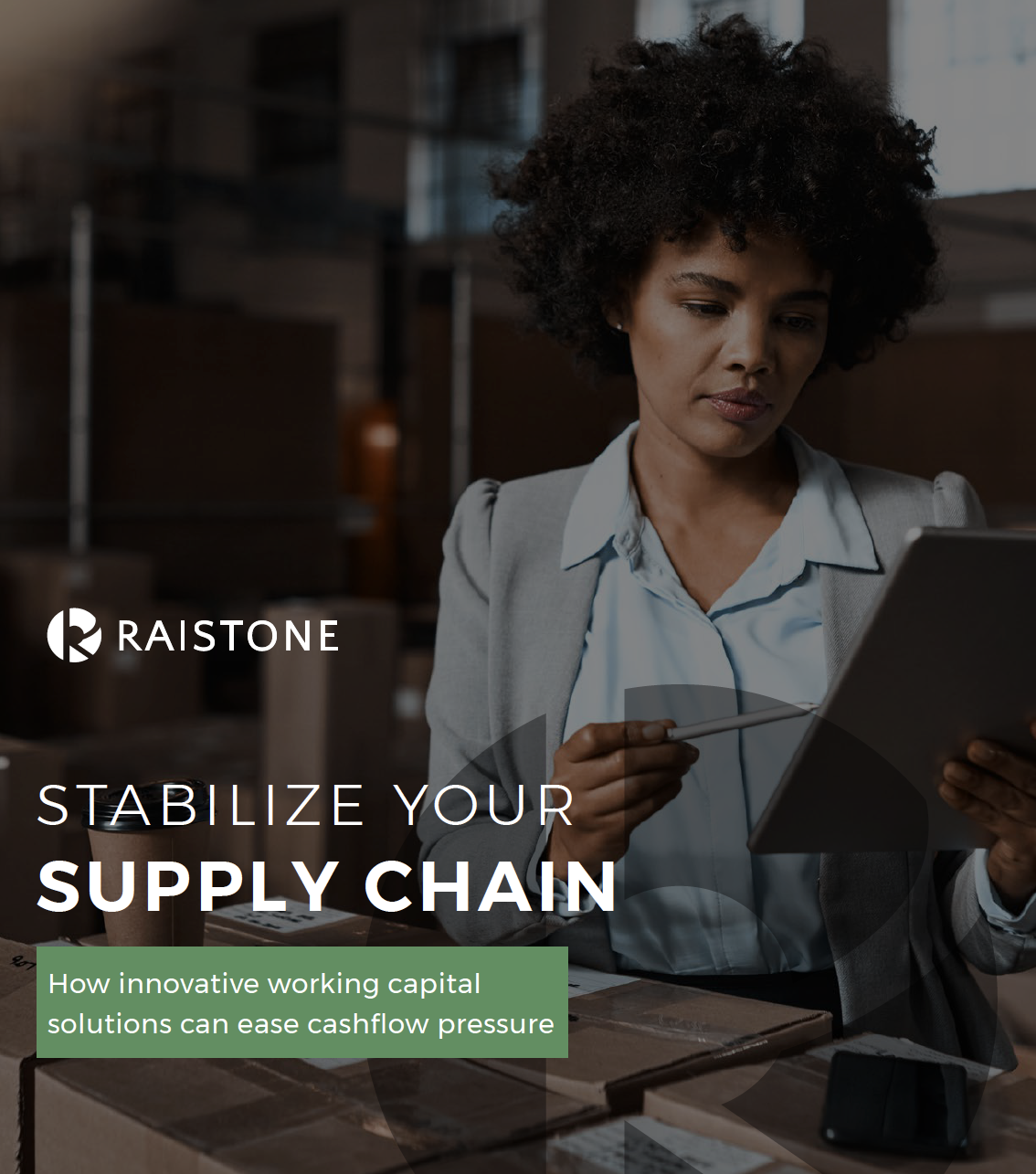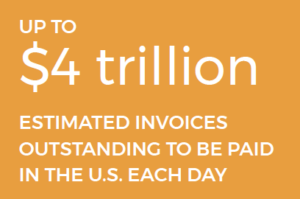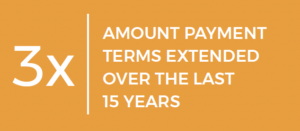Whitepaper
Ease cashflow pressure with innovative working capital solutions
In this whitepaper, Raistone details how there is as much as $4 trillion worth of invoices outstanding on any given day in the U.S., as businesses frequently wait as long as 180 days for payment.





 Companies experiencing financial strain caused by global supply chain disruption, higher shipping costs and frustrating payment delays are turning to innovative working capital solutions to ease cashflow pressure.
Companies experiencing financial strain caused by global supply chain disruption, higher shipping costs and frustrating payment delays are turning to innovative working capital solutions to ease cashflow pressure.
Businesses of all sizes are facing significant cashflow challenges, largely precipitated by the Covid-19 pandemic but made worse by a series of events that have led to a global supply chain squeeze that is unparalleled modern times.
Analysis by Raistone estimates that as much as $4 trillion worth of invoices are outstanding on any given day in the US. Many of those waiting to be paid are small- and medium-sized businesses (SMBs) that do not have access to extra liquidity from international money markets or flexible lines of bank credit.
Some of them will undoubtedly require cash to pay salaries and keep the lights on until invoices are settled. However, according to Raistone, those that need cash most immediately are actually successful businesses that have seen demand for their products soar and are scrambling to crank up production.
They face a painful mismatch between the time they need to pay their suppliers and the months they must wait for customers to pay. Low-cost working capital solutions that neither involve taking on debt nor surrendering equity can play a critical role in bridging this gap.

A company that is struggling can always cut staff and close facilities, but one that is growing does not have that option. More bankruptcies occur during increased economic activity as demand increases and more strain is put on working capital… Companies don’t die from starvation — they die from over-eating.
Dave Skirzenski, CEO of Raistone
When the pandemic sparked lockdowns around the world, temporarily paralyzing many businesses, production of key manufacturing components such as silicon chips was either scaled back or halted. Consequently, many factories were short of vital components just as they tried to get back to full production capacity.
But the crisis has expanded well beyond individual components like car parts, or consumer goods like smartphones. A ripple-down effect has led to a massive traffic jam that touches every part of the supply chain, including shortages in labor, transportation, and even storage space.

THE DOMINO EFFECT
That domino effect has extended from Wall Street, where some of America’s biggest companies have reported multi-billion-dollar revenue hits, all the way to main street, where consumers have been frustrated by shortages of cars, toys, phones and household goods.
The situation worsened in March 2021 after a huge container ship blocked the Suez Canal, closing one of the main arteries of global trade for six days. Around 12% of the world’s trade passes through the canal and during those six days, more than 300 vessels had to wait until the blockage was cleared or seek alternative routes.
 The incident sent freight costs soaring. Even when container ships were able to offload at US deep water ports, a shortage of truck drivers hampered efforts to transport goods to their final destinations. These issues have only continued since, and show no signs of improving in the near future, with some experts predicting they could last until 2023[2].The supply chain crisis has been accompanied by a progressive extension in payment terms, particularly as businesses look to offset negative impact of the pandemic on their own cashflow and debt positions.
The incident sent freight costs soaring. Even when container ships were able to offload at US deep water ports, a shortage of truck drivers hampered efforts to transport goods to their final destinations. These issues have only continued since, and show no signs of improving in the near future, with some experts predicting they could last until 2023[2].The supply chain crisis has been accompanied by a progressive extension in payment terms, particularly as businesses look to offset negative impact of the pandemic on their own cashflow and debt positions.
Raistone estimates that the length of time businesses must wait from the day they submit an invoice until they receive the cash they are owed has trebled over 15 years. It is now common for businesses to wait as long as 180 days for payment, putting balance sheets and bank accounts under pressure.
While Nasdaq and Fortune 500 companies can largely access sufficient capital to ride out a period of instability; it is different matter for suppliers further down the supply chain.
SMB OWNERS
For SMB owners, a financial solution capable of delivering multiple benefits is an attractive proposition. Raistone research has found that besides having access to increased working capital, SMBs particularly value predictable and reliable payment schedules, improved cashflow and potential to strengthen their balance sheets.
This is particularly true in the current business environment in which companies have been buffeted by unforeseen circumstances and have had to adapt quickly.
Right now, it makes sense for strong companies to significantly increase their lines of credit, either to weather the storm or fund growth as opportunities arise.
Mark Fagan, Citrin Cooperman

“Supply chains always work themselves out and this situation will normalize at some point,” says Raistone CEO Dave Skirzenski. “A company that is struggling can always cut staff and close facilities but one that is growing does not have that option. More bankruptcies occur during increased economic activity as demand increases and more strain is put on working capital.
“Firms that get more and more orders will have a continuous working capital gap. The right kind of financing helps them through that period so they can accept more orders and grow the business.
Businesses don’t die from starvation — they die from over-eating.”
It is a theme echoed by Mark Fagan, leader of the manufacturing and distribution practice at professional services firm Citrin Cooperman. “Right now, it makes sense for strong companies to significantly increase their lines of credit, either to weather the storm or fund growth as opportunities arise.”
 He says today’s uncertain climate makes it important to adopt a forensic approach to understanding what is going on deep within supply chains.
He says today’s uncertain climate makes it important to adopt a forensic approach to understanding what is going on deep within supply chains.
“Companies really need to understand their suppliers in granular detail, even the smallest players at the very end of line that make tiny components or subassemblies,” says Fagan. “They are not on the radar of the big ratings agencies but you need to know how strong they are because it could have an enormous effect on the whole manufacturing process if they get into financial difficulty.”
To access the cash needed to expand, SMBs have traditionally had to rely on selling equity or negotiating credit facilities with banks. However, taking on external investors dilutes the control of owners, while bank loans must be periodically renegotiated as the business grows.
Both routes commonly involve months of due diligence checks and reams of paperwork. By the time the money drops into its bank account, the company may already need more cash to take advantage of yet more opportunities.
The situation is even more challenging for minority- and women-owned business enterprises (MWBE), many of which are SMBs. A 2021 survey from the U.S. Federal Reserve[3] found that 11%of Black-owned businesses earn revenue greater than $1 million, compared with 37 percent of white businesses.
Businesses owned by minorities were also disproportionately affected by Covid-19: The same survey revealed that 67% of Asian- and Black-owned firms, along with 63% of Hispanic-owned firms, reported reducing their operations following the onset of the Covid-19 pandemic. All of those numbers fared worse than whiteowned
businesses, at 54%. For female-owned businesses, Covid-19 also had a greater effect when compared to companies run by men. A late 2020 survey from the U.S. Chamber of Commerce[4] found that women-owned businesses were far less likely to invest or increase staffing after the pandemic began. In addition, female-led businesses that expected to increase their revenue fell by 14 percentage points from before the pandemic, to 49%, while businesses run by men were statistically unchanged, as 57% still expected to grow their revenue even after the onset of Covid-19.
To help address these disparities, Raistone recently announced it will waive enrollment fees for MWBEs in the supply chain through the end of 2022. By providing working capital to vulnerable SMBs at reduced cost, Raistone can help them survive and thrive, even amid a global crisis.
BENEFITS OF WORKING CAPITAL FINANCE
Working capital finance is the ideal solution for many organizations seeking to fund a rapid growth spurt – as well as those experiencing temporary cashflow problems caused by supply chain disruption.
“What we do is take an asset a company owns, in the shape of its accounts receivable, and convert that into cash quickly so it can be used to pay bills and fund growth,” says Raistone’s Dave Skirzenski. “Working capital finance is an accelerant for growing companies that keeps pace with the speed of their development and is much more efficient than other options.”
Essentially, companies like Raistone that provide working capital finance repackage the $4 trillion worth of invoices outstanding daily into a financial product that can be bought and sold like any other package of corporate debt.
Crucially, for the supplier with the outstanding invoice, the process releases the cash they are owed almost immediately.
Raistone takes responsibility both for structuring and managing deals with investors who want to invest in accounts receivables. It also takes responsibility for prompt and regular disbursement of payments due to customers.
This solution eliminates frustrating and lengthy waits for payment as the original payment terms imposed by end-user customers no longer apply and trading of invoices happens independently of the original customer.
“The institutional market says this is an attractive asset class because there is no correlation with the performance of equities and bonds,” says Dave Skirzenski. “It performs better in down times because everyone is searching for working capital and grows in good times because company owners have more demand for cash to fund expansion. Historically, it has performed better than loans, equities and fixed income debt.”
This type of sophisticated working capital finance, that makes use of international markets to securitize packages of accounts receivable and release working capital, has been available to large corporate for decades. It has been popular with corporates because it gives treasurers more flexibility in managing cash and enables businesses to extend payment terms without having a negative impact on trusted suppliers.

CASH CONVERSION CYCLE
Working capital finance also improves the cash conversion cycle of a company – a key metric for investors that measures the gap between an order being placed to when cash is realized for that sale and suppliers are paid.
While this high-level financial management is commonplace at large corporates, technological advances mean it is now a cost-effective solution that can deliver the same benefits to businesses of all sizes.
Many of the companies Raistone deals with are not tracked by major ratings agencies like Moody’s and S&P. However, Raistone has devised algorithms that analyze factors such as the track record and payment history of all parties in a transaction.
With all these factors laid out on a dashboard, Raistone’s data team then awards companies a ‘RaiScore®’ that accurately reflects their current risk profile and determines financial terms they are offered.
It is a clever use of innovative fintech. Algorithms sift through millions of invoices, pulling in data from a range of secondary sources that most small enterprises would not have time or capacity to check. The aim is to establish patterns, spot discrepancies, and give confidence to investors.
“Banks and institutional investors are now comfortable with buying that asset based on the RaiScore® because they understand how it was created,” says Dave Skirzenski. “We have used fintech to reduce operational effort required by investors and also to reduce effort required by the business that needs the working capital.
“In addition, we have allowed the largest enterprise software firms in the world, like SAP and Oracle, to deploy a working capital tool to their millions of users using a simple set of APIs (Application Programming Interfaces). That means they can embed our capabilities in their platforms in a matter of weeks and we will handle all the administration, risk management and payment reconciliation on their behalf.”
EVOLVING TECHNOLOGY
As technology evolves, funding decisions for those who have access to Raistone’s services will be made even faster. Risk mitigation tools for customers will become more sophisticated and buy now, pay later options will help companies of all sizes across the supply chain to smooth cashflow, improve their credit ratings – and boost their RaiScores®.
With supply chain strains persisting, Raistone is encouraging large corporate customers to ensure their entire supply chains have access to working capital, whether it is by leveraging their own balance sheets to provide it or introducing trusted third-party suppliers of working capital.
“Those smaller companies in the supply chain may be overwhelmed by choice so it is good to get guidance from a large customer that they trust,” says CEO Skirzenski. “We have plenty of evidence that shows when corporates offer a trusted and practical solution, it is something their suppliers respond to very positively.”
REFERENCES
1. https://www.reuters.com/world/uk/uk-factories-report-worst-shortage-stocks-record-cbi-2021-08-23/
2. https://news.yahoo.com/supply-chain-issues-2023-shipping-164403284.html
3. https://www.fedsmallbusiness.org/medialibrary/FedSmallBusiness/files/2021/sbcs-report-on-firms-owned-by-people-of-color
4. https://www.uschamber.com/small-business/coronavirus-pandemic-disproportionately-affecting-female-owned-small-businesses




